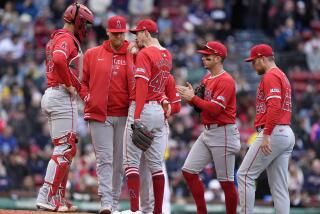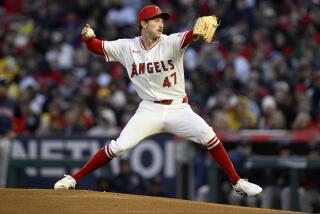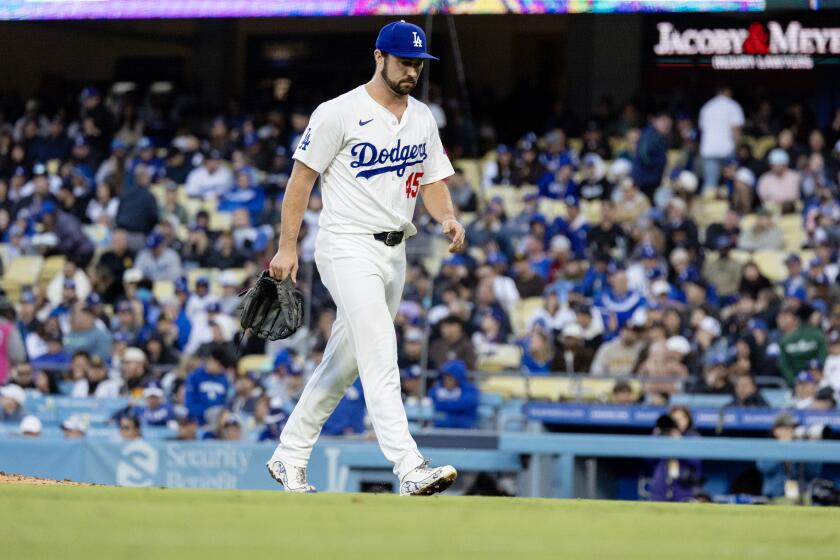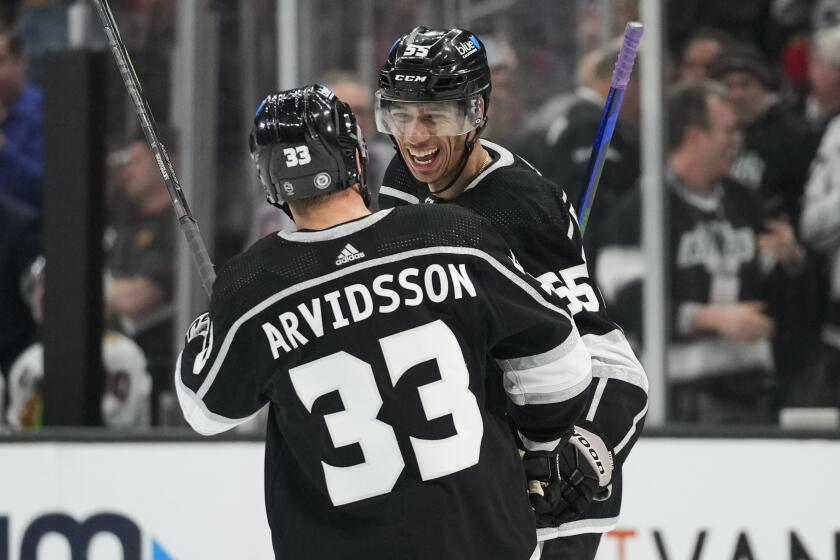Chris Sale can’t deliver in the Red Sox’s 7-2 loss to Astros in Game 1 of ALCS
Long before being ejected in the fifth inning for arguing a called strike, Boston Red Sox’s first-year manager Alex Cora had a different problem to solve Saturday night at Fenway Park.
He’d tabbed ace Chris Sale to start Game 1 of the American League Championship Series against the Houston Astros. Cora had trusted Sale to mow down the Astros and lead the Red Sox to a good start in their quest to dethrone the reigning World Series champions.
But as he stood on the steps of the first base dugout, Cora watched another scene unfold. Sale, the left-hander who this year led the major leagues in walks and hits per innings pitched (0.86) and strikeouts per nine innings (13.50) despite making only 27 starts, struggled with command. Sale fumbled around for his velocity, failed to locate the diminished product he was throwing early on and ultimately doomed the Red Sox in the Astros’ 7-2 victory.
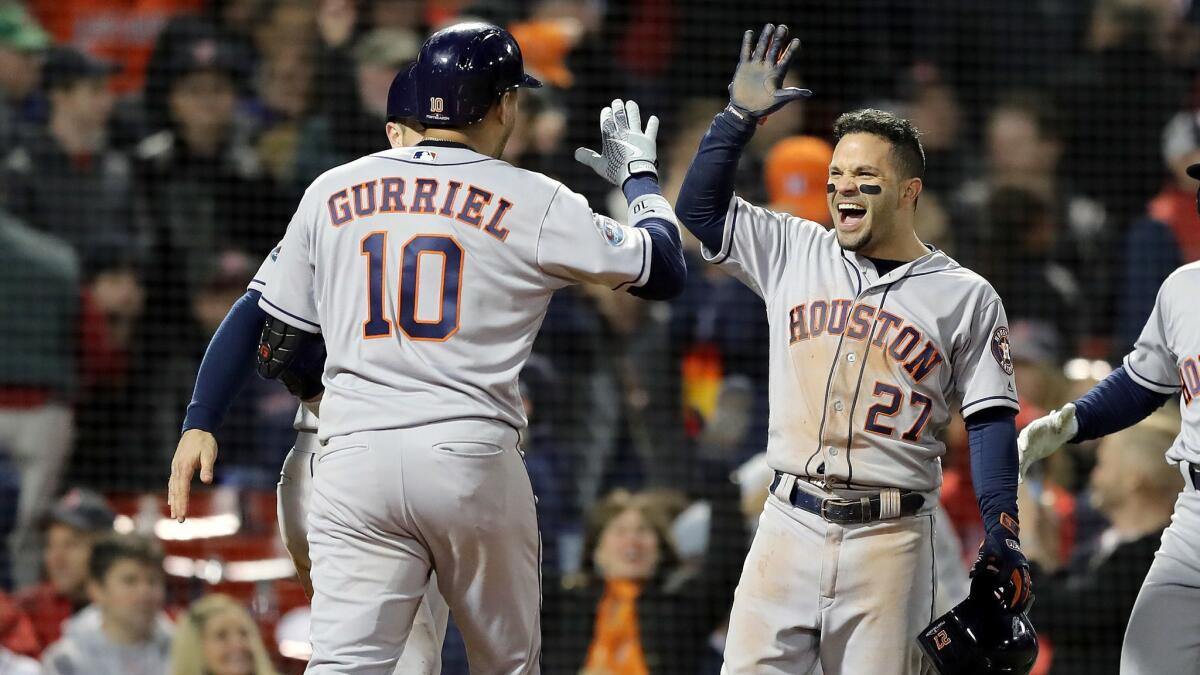
Although Sale walked the first batter of the game, it was the second inning that started the downfall. He got two easy outs on five pitches to start the frame, but wound up throwing 34 in the inning. His slider kept missing the spots called by catcher Sandy Leon. A 96-mph fastball slipped out of Sale’s grip and hit Martin Maldonado on the wrist. The Astros took a 2-0 lead when George Springer singled to left field to cap an eight-pitch at-bat.
The phone in the Red Sox bullpen rang within moments, setting off a flurry of activity to bail Sale out of trouble. But three pitches later, Sale induced a groundout from Jose Altuve to end the inning.
He returned to the dugout, head lowered and steps measured. Joe Kelly, who’d begun to warm up hurriedly in the bullpen, took back his seat on the bench.
Sale, who pitched four innings and threw only 50 of 86 pitches for strikes, went out for two more frames and looked settled down. He yielded no other hits, Springer’s single the only knock off Sale.
By the fourth, Sale looked like the pitcher he was supposed to be: The one who overcame fatigue, made do with what he had, regained command of his slider and drew a trio of swing and misses with the pitch after getting only one batter to whiff at it in the previous three innings.
Sale, 29, would have gone out for a fifth inning, but Cora refused to put him at risk.
“Velocity-wise, he finished strong,” Cora said. “But I decided — he wanted to go out again and I was like, ‘No, man, it’s going to be a long series. We need you.’”
That the optimal version of Sale showed up at all is significant for the Red Sox. He’d been plagued by inflammation in his left shoulder during the final two months of the regular season. The injury kept him off the mound for all but 17 innings after July 31. When his velocity dipped in his last September start, alarm bells went off again. Would the Red Sox, who already had question marks in the bullpen, be doomed to wade into the postseason without their No. 1 starter?
Sale settled those fears when he gave up two runs and five hits in 5 1/3 innings in Game 1 of an American League Division Series against the New York Yankees. He assuaged any lingering doubts about his health when he was summoned for the eighth inning of Game 4 of the ALDS and retired the three Yankees he faced. In both outings, his fastball hovered in his usual range of 94-95 mph.
Although he ratcheted up the velocity to a max of 96 mph, Sale averaged just 92 mph on his fastball Saturday. The performance prompted continued questioning of his wellbeing, even after he made an adjustment between innings and righted course.
“You kinda know what you need to do when something like that happens,” Sale said.
His correction, however, came too late.
Astros starter Justin Verlander scythed the Red Sox offense. He carved out six strikeouts, using a fastball that topped out at 98.8 mph as his main weapon. At one point, he retired 10 batters in a row. He gave up only two hits in six innings.
But Verlander, too, fell victim to command issues. He walked in one run in the fifth inning and watched another run cross the plate when his curveball to Andrew Benintendi bounced away for a wild pitch. Three of the four walks Verlander issued came in that fifth inning.
Unlike Sale, Verlander didn’t let the problem snowball. He retired the last four batters he faced and departed after the sixth inning, in line for the 13th postseason victory of his career.
“I mean something threw off my timing, something I’ll probably look at,” Verlander said. “But to be able to get out of that inning keep us tied, not relinquish the lead, that was, for me, the ballgame.”
The Red Sox couldn’t muster much against the Astros bullpen, either. In the final three innings, they reached base twice but failed to convert each opportunity. In all, the Red Sox left nine on base.
But Boston’s woes on offense do not erase this: An AL East team has not played in the World Series since the Red Sox won the pennant in 2013. The Red Sox wound up taking home that title, beating the St. Louis Cardinals in six games.
If they were going to have a chance against the top-shelf pitching the Astros have deployed this season, the Red Sox on Saturday needed Sale to smooth their path.
Sale failed.
“I think he did all that he could,” Leon said in Spanish. “He kept us within two runs. Unfortunately, we couldn’t hit. … I think he did everything he could to keep us in the game.”
More to Read
Get our high school sports newsletter
Prep Rally is devoted to the SoCal high school sports experience, bringing you scores, stories and a behind-the-scenes look at what makes prep sports so popular.
You may occasionally receive promotional content from the Los Angeles Times.
